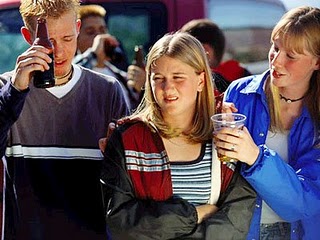Update: Protecting Teenagers and Kids From Alcohol, Smoking and Drugs
publication date: Apr 24, 2014
Whether you have kids or not, you have a stake in every generation of kids coming up because their actions affect your safety (and future Social Security benefits!) If you have kids of your own, I don't need to tell you how much more you have at stake.
Companies and individuals who profit from addictions are always seeking to attract and retain long-term customers is to target teenagers (and in some cases younger kids), who are the easiest converts due to their susceptibility to peer-group pressure and undeveloped decision-making skills. Parents must protect their children who are so vulnerable and easily swayed to take risky and dangerous actions. Consider these statistics: The average age of first-time alcohol use is twelve years and two months, followed by twelve years and six months for cigarettes and thirteen years and eleven months for marijuana (the most popular illegal drug among adolescents).
How high are the stakes? "A child who reaches age 21 without smoking, abusing alcohol or using drugs is virtually certain never to do so," says Joseph A. Califano, Jr. (photo below), founder and former chairman and president of The National Center on Addiction and Substance Abuse (CASA) at Columbia University and a former secretary of the U.S. Department of Health, Education, and Welfare.

The risk that teens will smoke, drink, get drunk, and use illegal drugs increases sharply if they are highly stressed, frequently bored, or have substantial amounts of spending money, according to the "National Survey of American Attitudes on Substance Abuse VIII: Teens and Parents," a survey conducted by CASA:
- High-stress teens are twice as likely as low-stress teens to smoke, drink, get drunk, and use illegal drugs.
- Often-bored teens are 50 percent likelier than not-often-bored teens to smoke, drink, get drunk, and use illegal drugs.
- Teens with $25 or more a week in spending money are nearly twice as likely as teens with less to smoke, drink, and use illegal drugs, and more than twice as likely to get drunk.
- Teens exhibiting two or three of these characteristics are at more than three times the risk of substance abuse as those exhibiting none of these characteristics.
"High stress, frequent boredom and too much spending money are a catastrophic combination for many American teens," said CASA chairman and president and Joseph A. Califano, Jr. "But it is a catastrophe that can be avoided through parental engagement. Parents must be sensitive to the stress in their children's lives, understand why they are bored and limit their spending money."

The CASA survey also found that parents are more likely than teens to view teen drug use as a fait accompli. More than four out of ten parents said teens are "very likely" or "somewhat likely" to try drugs, compared to only one of ten teens who agreed with those statements. Teens whose parents believe that future drug use is "very likely" are more than three times more likely to become substance abusers than teens whose parents say future drug use is "not likely at all."
"Many parents think they have little power over their teens' substance use and a disturbing number view drugs in schools as a fact of life they are powerless to stop," notes Califano. "How parents act, how much pressure they put on school administrators to get drugs out of their teens' schools, their attitudes about drugs, and how engaged they are in their children's lives will have enormous influence over their teens' substance use. Parent Power is the most underutilized weapon in efforts to curb teen substance abuse."
CASA recommends five ways that parents can reduce the risk of their teens engaging in smoking, drinking, or other substance abuse:
- Be sensitive to the stress in your children's lives and help them cope. Kids today face all sorts of peer pressure in school to fit in socially. Academic pressures are problematic as well, particularly in high school and when children are preparing to apply to colleges. I can tell you as an alumni interviewer for my alma mater (Yale) that many of the kids I speak with today are leading the lives of over-scheduled little adults. A twelve-hour day isn't unusual for high school kids: After a seven-hour school day, most of these kids spend several hours on extracurricular activities and several more on homework.
- Understand when and why your children are bored and help relieve their boredom. Children don't need non-stop entertainment, and you certainly won't be doing the best by your kids if you constantly plan out their days, activities, and social calendar. However, at key times, you can play a vital role in helping them to recognize opportunities and keep them from likely trouble.
- Limit the amount of money your children have to spend and monitor how that money is spent. A simple way to track kids' spending is to have them use a VISA debit card that limits what they can spend because it's connected to a checking account that you monitor.
- Know who your children's friends are. Spend time speaking with their parents. Never assume - ask questions.
- Be engaged in your children's lives. Discuss their homework with them, attend their sporting events, participate in activities together, and talk to them about drugs.



